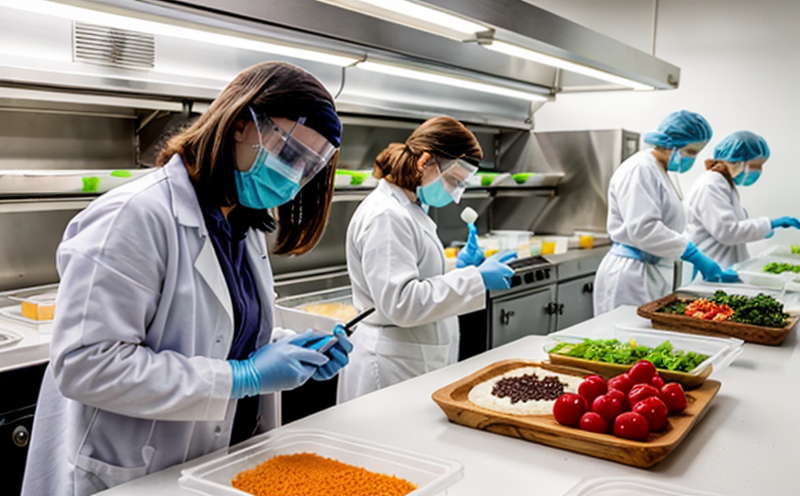Codex Alimentarius Microbiological Criteria Testing in Food
The Codex Alimentarius Commission is a joint United Nations agency that provides guidelines and standards to ensure food safety, quality, and fairness of trade in foods. One of the key aspects of this work involves setting microbiological criteria for food products. This service focuses specifically on testing food samples against these standards as outlined by the Codex Alimentarius.
Microbiological testing is essential in ensuring that foods meet international safety and quality standards, thereby protecting public health. The Codex Alimentarius criteria are designed to ensure consistency across different regions and countries. This service ensures compliance with these standards through rigorous laboratory analysis.
The process begins with the selection of appropriate sampling protocols based on the type of food being tested. Proper sample collection is crucial for accurate testing results. Following collection, samples undergo preliminary examination where they are prepared according to specific guidelines provided by Codex Alimentarius. This includes dilution, plating, and incubation steps which allow for the isolation and growth of potential pathogens.
Once isolated cultures have been identified, further characterization is conducted using various techniques such as biochemical testing or molecular methods like PCR (Polymerase Chain Reaction). These analyses help determine whether organisms present in the sample meet or exceed acceptable levels set forth by Codex Alimentarius. Compliance with these limits ensures that food products do not pose a risk to consumers.
After completing all necessary tests, detailed reports are generated summarizing findings along with recommendations for corrective actions if deviations from acceptable criteria were detected during testing. These reports serve as crucial tools for quality management teams responsible for maintaining high standards within their organizations.
To ensure reliable results, this service utilizes state-of-the-art equipment and methodologies recommended by Codex Alimentarius. Our team of experts employs advanced laboratory techniques such as quantitative PCR (qPCR), next-generation sequencing (NGS), and other cutting-edge technologies to deliver precise measurements of microbial load in food samples.
Furthermore, we adhere strictly to international standards including ISO 17025 accreditation for our laboratories ensuring that all procedures meet stringent quality control requirements. This guarantees accurate results every time while also providing peace-of-mind knowing that your organization is meeting global expectations regarding food safety and quality.
Scope and Methodology
| Test Type | Description |
|---|---|
| Bacterial Pathogen Detection | Detection of common foodborne pathogens like Salmonella, Listeria monocytogenes, and Escherichia coli O157:H7. |
| Mold and Yeast Counting | Quantification of mold and yeast species found in various types of processed foods. |
| Virus Detection | Determination of virus presence in raw ingredients used for manufacturing food products. |
| Step | Description |
|---|---|
| Sample Collection | Preliminary examination of the collected samples to ensure proper handling and preparation. |
| Dilution and Plating | Preparation of serial dilutions followed by plating on appropriate media for growth. |
| Incubation Periods | Standard incubation times allow sufficient time for microbial colonies to form. |
| Identification Techniques | Biochemical and molecular methods used to identify specific microorganisms present in the sample. |
| Data Analysis | Analysis of growth patterns, colony counts, and other relevant data points to determine compliance with Codex Alimentarius criteria. |
Industry Applications
This service finds application across various sectors including pharmaceuticals, cosmetics, personal care products, and medical devices. It plays a vital role in ensuring that ingredients used are safe for consumption or use by the general public.
- Packaging Integrity Testing: Ensuring that packaging materials do not release harmful substances into contact with food items.
- Supply Chain Monitoring: Continuous monitoring throughout the supply chain to catch any issues early on before they become major problems.
- New Product Development: Helping companies develop new products that meet stringent safety and quality requirements specified by Codex Alimentarius.
Beyond just testing, this service also provides valuable insights into areas where improvements can be made in processes or formulations to better comply with international standards. By providing comprehensive reports detailing findings along with actionable recommendations, organizations gain a deeper understanding of their current status vis-à-vis Codex Alimentarius requirements.
International Acceptance and Recognition
- The Codex Alimentarius criteria are recognized by more than 178 member countries worldwide, making them one of the most widely adopted sets of food safety standards globally.
- Countries that ratify these standards indicate their commitment to ensuring consistent quality and safety in traded foods.
- Adherence to Codex Alimentarius helps businesses gain access to markets where stringent regulatory requirements exist.
Our testing services are conducted according to internationally recognized methods, including those specified by the Codex Alimentarius Commission. This ensures that our results are accepted and trusted by regulatory bodies around the world.





